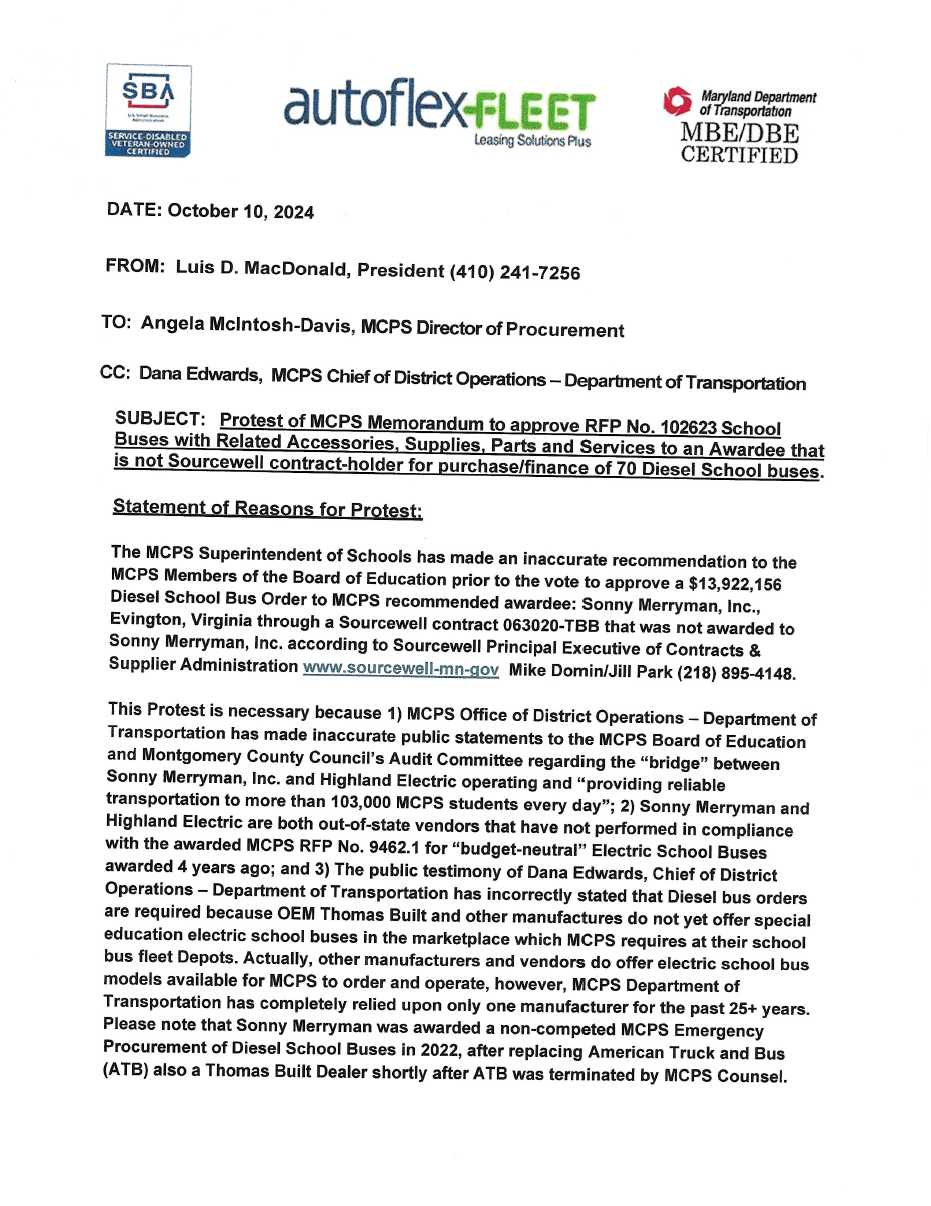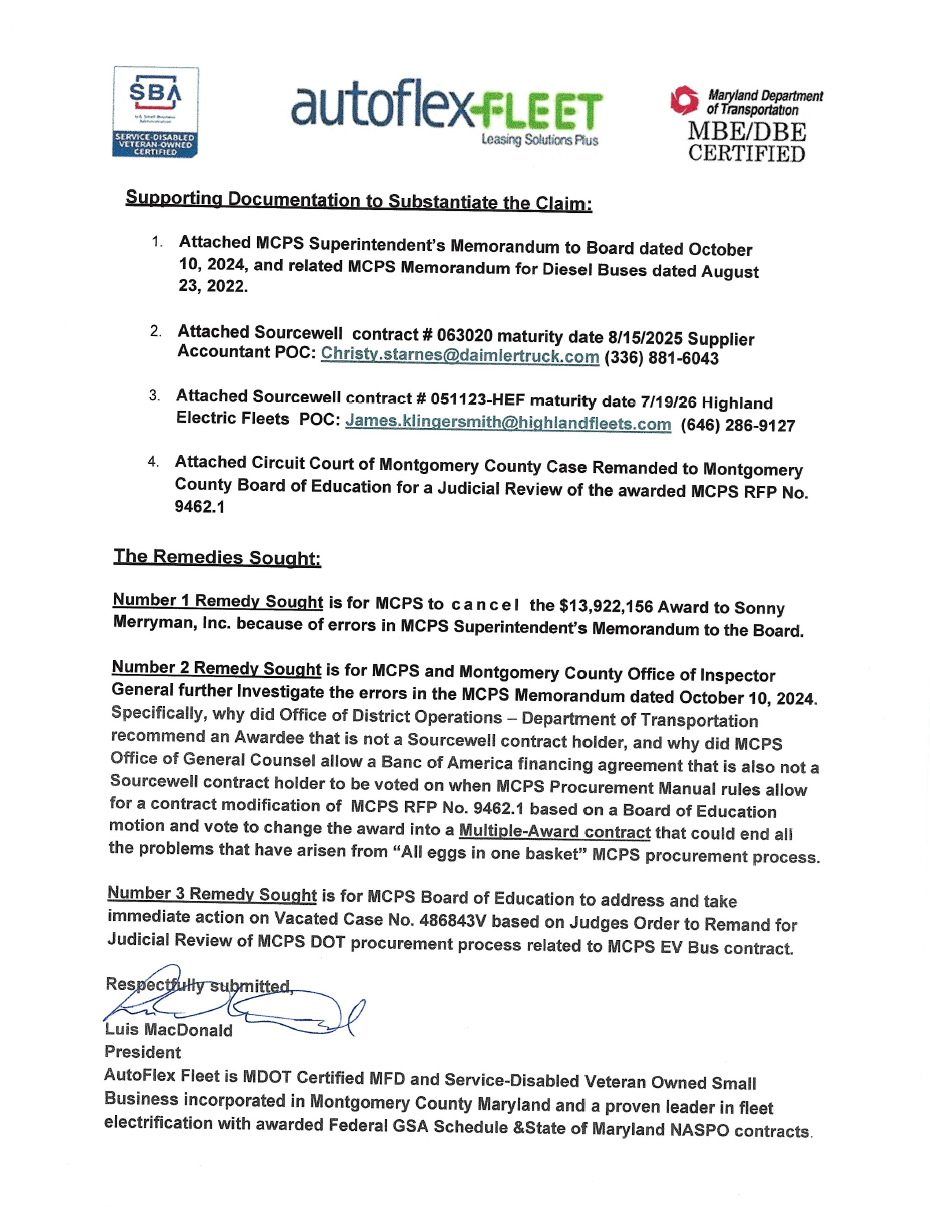By Adam Pagnucco.
In recent weeks, I have written repeatedly about MCPS’s electric bus contract, which has shorted out despite high expectations. Every time I think the story is losing voltage – ZAP! – another spark appears. It happened again last Thursday.
This is the story so far. More than three years ago, the school board approved a $169 million electric bus contract, which at that time was the biggest such contract in U.S. history. Under the contract, MCPS was supposed to lease a total of 326 electric buses by the end of 2025 with plans to “eventually replace the current fleet.” Former MCPS Superintendent Monifa McKnight, who took office after the contract was signed, claimed the contract “is going to cut costs by 50%.”
In fact, it did no such thing. The contract performed so poorly that MCPS acquired 90 diesel buses two years later. A county inspector general report last summer found “wasteful spending” as a result of failure to deliver buses and mechanical problems with delivered buses. MCPS admitted that the contractor, Highland Electric Trucking (HET), owed $1.5 million in performance fees due to its failures. Nevertheless, MCPS representatives told the county council that they intended to renegotiate the contract and might not even collect its fees in doing so.
That’s not all. After the contract award, two of MCPS’s four evaluators admitted to criminal activities in exploiting a diesel bus contractor who was affiliated with the winning electric bus contract bidder. A protest by a rival contractor resulted in instructions by the Appellate Court of Maryland that the school board must reconsider the original electric contract award. That reconsideration is still pending. Also, less than a year ago, an MCPS consultant questioned the assumptions of cost savings under which the contract was bid and described many operational problems in administering it.
This is the messiest MCPS contract I can remember. And there is more.
Last Thursday, the school board unanimously approved a contract request by current Superintendent Thomas Taylor to purchase 70 more diesel buses. Taylor’s memo contains the following language:
*****
This order supplements the annual replacement cycle and offsets the electric vehicle bus order through Highland Electric enabling DOT to operate and provide reliable transportation to more than 103,000 students every day.
Montgomery County Public Schools (MCPS) is committed to maintaining a mixed fleet of diesel and electric buses to maintain operational excellence. MCPS continues to have the largest electric bus fleet in the United States. While this request calls for 70 diesel buses, MCPS simultaneously is working with its electric bus vendor to place an order for 50 electric buses to maintain a full complement of 120 total buses in Fiscal Year 2026. A mixed fleet of diesel and electric buses is imperative for MCPS to operate at a high level of efficiency. Diesel buses are needed to cover longer bus routes, field trips in non-localized areas, and mid-day transportation services. Electric buses require charging after morning routes and will not have adequate time to charge at an optimal capacity to perform transportation services during the middle of the day.
*****
There are three interesting details in this language.
1. Taylor writes that MCPS “is committed to maintaining a mixed fleet of diesel and electric buses to maintain operational excellence.” However, MCPS has previously stated that it will have “an entirely electric school bus fleet in 10 years.” This is a big shift in fleet strategy.
2. Taylor writes, “Electric buses require charging after morning routes and will not have adequate time to charge at an optimal capacity to perform transportation services during the middle of the day.” That could be one reason why MCPS appears to be no longer committed to a 100% electric bus fleet. One problem here is that Maryland school systems are mandated by state law to purchase only zero emission buses starting in FY25 but there are ways to escape that requirement.
3. Taylor writes that, “MCPS simultaneously is working with its electric bus vendor to place an order for 50 electric buses to maintain a full complement of 120 total buses in Fiscal Year 2026.” But MCPS has stated that it would have 326 electric buses by 2025. This graphically demonstrates the shortcomings of the district’s electric bus contract.
It also may contradict the instruction by the Appellate Court of Maryland to reconsider the award of the electric bus contract. How can MCPS simultaneously fairly reconsider this contract while also stating its intention to purchase more buses under it?
This new diesel bus contract prompted a protest by AutoFlex Fleet, which is the losing bidder on the electric bus contract that took MCPS to court. AutoFlex’s new protest is shown below.


I’m in no position to judge the allegations made by AutoFlex against this new diesel bus contractor. But AutoFlex’s request for more investigation by the county’s inspector general, who has already lambasted the electric bus contract and was surprised by the volume of its performance fees, is ominous for MCPS. And AutoFlex is within its rights to demand that MCPS comply with a court instruction. Exactly who in Maryland is excused from complying with a court instruction?
I am not throwing Taylor under the bus quite yet. (I’m working hard on these metaphors, folks!) After all, he has to ensure that students are transported to school one way or another. But the evidence is mounting that this is a failed contract. It has been slammed by the inspector general, an MCPS consultant questioned its cost structure and its administration, a court has mandated that MCPS reconsider it and MCPS has twice now resorted to diesel buses to compensate for its failures. How much more can go wrong?
Will Taylor eventually pull the plug?
